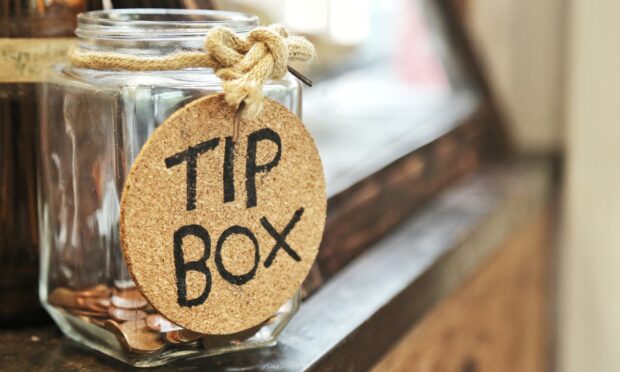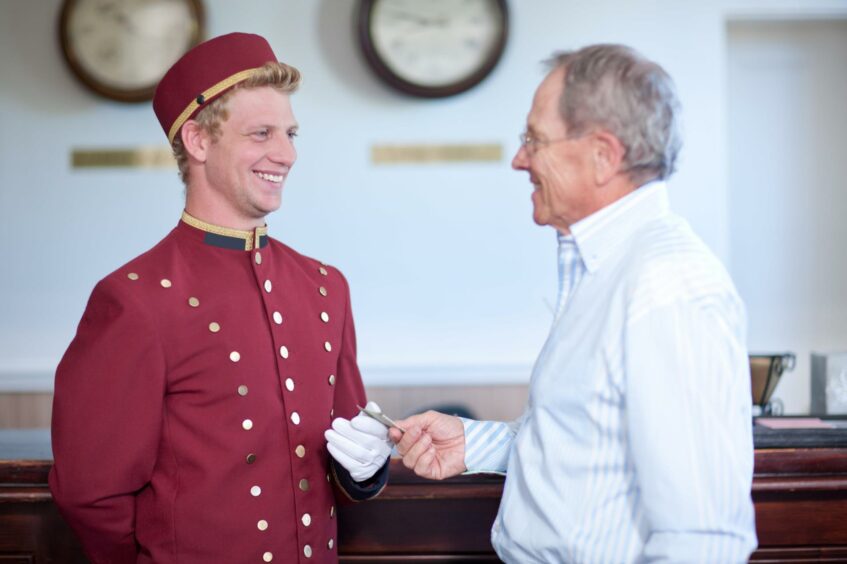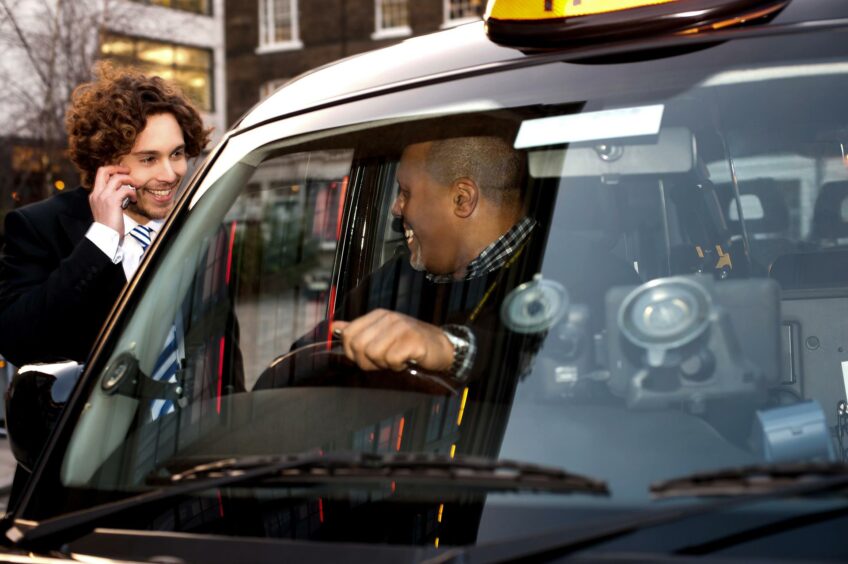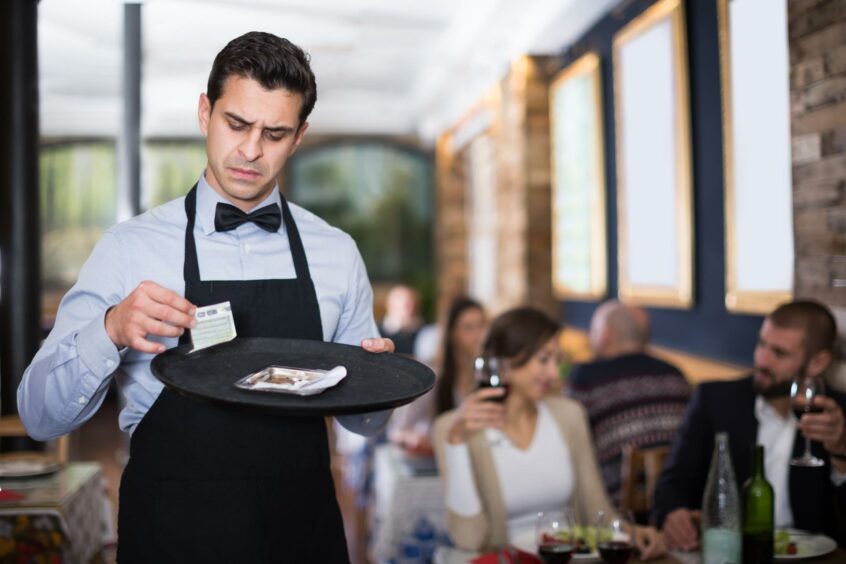In a nutshell, a tip, or gratuity, is a small sum of money given by a customer to service sector workers for a “job well done”. But only certain workers…
For example, we tip a waiter who brings us a coffee, but not a shop assistant who sells us a book. We tip taxi drivers but not bus drivers.
Is tipping a polite worthwhile thing to do? Or do you think it a bit of a con, and feel pressurised to give?
Tipping varies dramatically the world over. It’s common in Spain, Germany and France, but not so big in Portugal or Austria. In Asia, it’s not common at all, not part of their culture, although that seems to be changing as they adopt western “values”.
Tipping normal service in the USA
In the US, tipping is big business indeed. In fact, it’s a near given and you’re “expected” to tip bartenders, taxi drivers, hotel staff, tour guides and waiters.
Having said that, America is a very consumer driven/customer satisfaction society, so the service you receive will usually be very good.
In Russia, where I’ve been going for 27 years, I’ve watched the tipping culture evolve with interest. Customer service in the ’90s even in Moscow was appalling, near non-existent. They had no clue. Not their fault I guess, that’s what living under a Soviet system does.
Things, though, have improved dramatically, and the service in Moscow or St Petersburg cafés and bars is often excellent these days.
The same can’t be said for supermarkets though. Checkout staff are both poorly paid and bored out of their minds. They barely look at you, let alone smile or say hello or thank you.
The situation in hospitality may well have changed in Moscow, but far away in provincial Russia, not so much so.
I was in a hotel in Volgograd, previously called Stalingrad. The hotel was awful, as was the customer service. Yet, they had, of course, honed in on the western habit of tipping.
Service without a smile
The receptionist was a classic Russian middle-aged woman, ginger hair and gold teeth. She didn’t smile, and almost grunted her disproval at my arrival. She seemed to view my staying there as an inconvenience, or a nuisance.
Any problem I had, eg a light not working in my room, or the water being turned off, was met with a brush off as she shook her head and went back to the book she was reading.
Oh yes, she had most definitely graduated from the Soviet school of charm with an A+.
I tried in vain to get a smile out of her for a whole week. Nothing.
On finally checking out and paying my bill in cash, it became apparent to me that she was looking for a tip. I couldn’t believe it.
“You want a tip?” I asked her as I pocketed my change.
She nodded her head. She understood me. Funny that, when it came to money, she miraculously understood.
“OK, here you go,” I said. I leaned in ever so slightly and said in a whisper: “Don’t step on to the street in front of a moving bus,” and smiled.
She took a second or two to work it out, then scowled.
But what about in our own country? What should foreigners coming here expect?
According to the website Visit Britain, tipping is not expected in Great Britain. It states: “Although it’s not necessary to tip, it’s always greatly appreciated and will be greeted with that endearing British politeness.”
They say it’s “normal” to tip taxi drivers, or to “round up the fare” to the nearest pound.
If the taxi driver has been especially kind, say with helping you with your luggage, you should consider tipping up to 15%.
Do you agree? Or do you think you’ve already paid enough?
Do hairdressers deserve an extra cut?
Apparently, many hairdressers also get tips. I didn’t know that. Mind you, it’s been decades since I’ve needed the use of their services.
Do you tip your hairdresser? Or do you think you’ve already paid them in the fee they charge?
Home food deliveries have skyrocketed during recent lockdowns. Do you get food delivered to your house? If so, do you tip the delivery driver?
But of course, the big one, when it comes to tipping, is when you visit a restaurant. I asked around regarding this topic and was told the following.
“Restaurant staff are often poorly paid, so yes they should definitely get a tip.”
However, another friend said to me: “Why? Everyone by law has to be paid the minimum wage, we should not tip anyone. It’s up to the restaurant owner to pay their staff more, not expect us customers to bulk up their wages.”
Which statement do you agree with?
I’ve also heard people comment that by encouraging tipping, it actually incentivises staff to work harder, in order to get a tip. Interesting thought.
Have you ever wondered, if you do leave a tip, where it actually goes? Into whose pocket I mean. Does it go to your waiter directly, or does it go into a pot and is divided up later among all waiting staff?
“Yes, they deserve it,” you may say. Fair enough, but what about the chef who cooked the actual meal, or the guy who peels the spuds, or the person who washes the dishes? Do they, should they, get a share of any tip we leave?
I’d guess that individual establishments have their own rules, but I really don’t know.
Or do bosses still keep a portion of the tips? I actually think that’s been banned, and rightly so in my opinion.
But what about when a tip or “service charge”, as it’s often called, is automatically added to your bill. Is that right? Is it legal? Do you have to pay it? I hate when that happens.
Hidden charges could be on the cards…
Here’s what happened to me in a restaurant in Scotland last year.
“How would you like to pay?” Asked the smiling waiter when I called him over.
“Mastercard. But can you take that off first please?” I said, pointing to the already added to my bill service charge.
He looked at me, clearly not happy.
“So, you won’t be paying a tip?” he said.
“I never said that.”
Now he was confused.
“So, you will pay the amount on the bill?” he asked.
“No. If I want to tip, I’ll do it with cash off my own back,” I told him.
With a terse face he removed the tip and I paid my bill. At this point, I decided, he’d just lost his tip.
I did not like the fact the tip had been automatically put on my bill.
My view is that if I want to tip, I will do so, but at an amount that I think relative, not what the restaurant owner decides I should pay.
On this occasion, due to the waiter’s attitude, I chose to leave nothing. Had he not reacted like this, and the tip not been automatically added to my bill, I would have left 10%.
I mentioned this to the restaurant manager on leaving. He actually sympathised with me, but said it wasn’t his call.
It’s all a bit murky though. According to consumer champion Which magazine, if you’re “told” (in advance I’d imagine) of a compulsory service charge, you “must” pay it, unless the service was particularly poor.
My final tip.. stand up for yourself
However, it also states on its website: “…you have the right to refuse to pay the service charge.”
So, next time you’re in a restaurant, if the tip is already included on your bill, and if you’re not happy with that fact or especially with the service, then I’d say don’t be intimidated.
Of course, if you feel the service has been excellent and you want to tip, then go ahead, but maybe pay the amount you decide is appropriate?
What do you think about tipping? A good idea, or should it be banned?
Do share.






